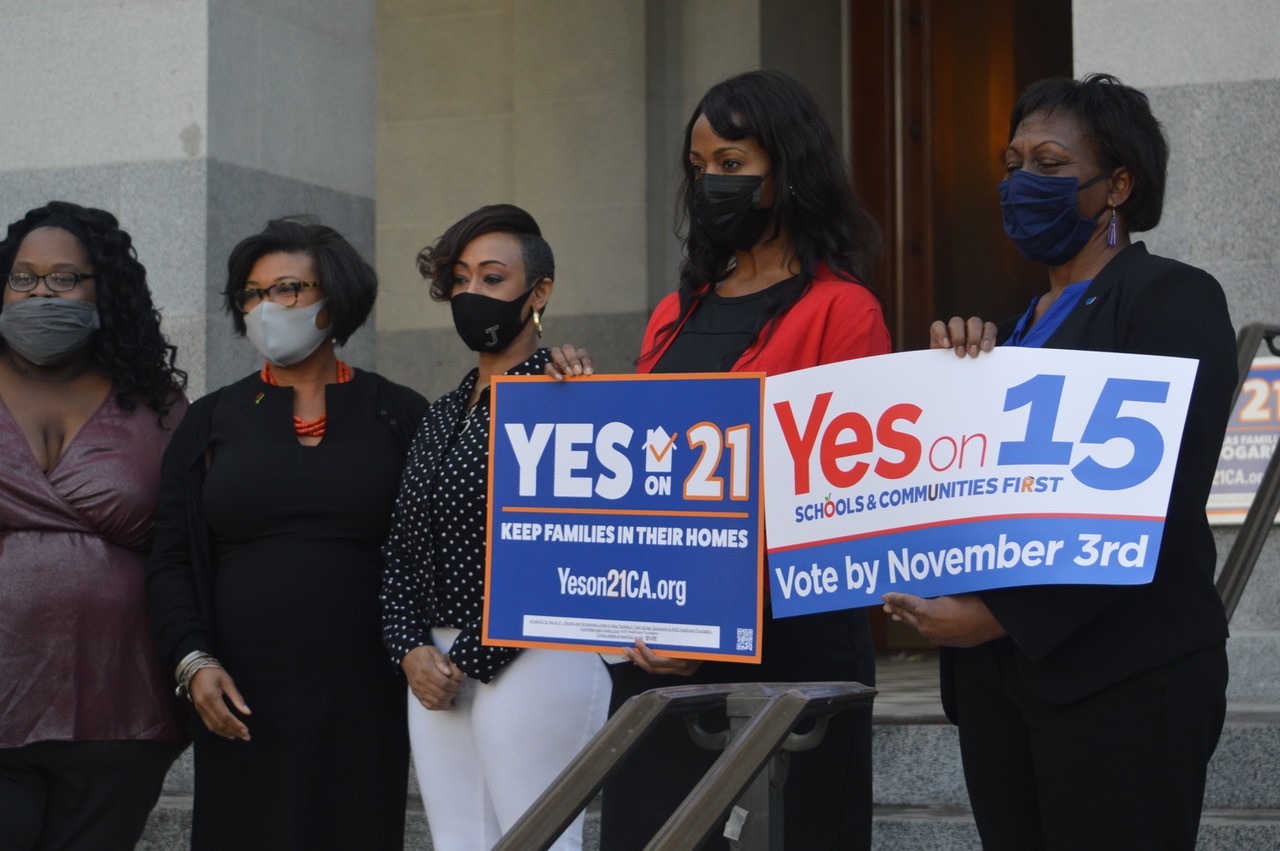#NNPA BlackPress
California Dem Party African American Caucus Endorses Propositions

The California Democratic Party African American Caucus (CDPAAC) hosted press conferences at four locations across the state to call on Black Californians to support what that group has deemed as the “pro-Black” propositions on this November’s ballot.
The news conferences were held in metropolitan areas with some of the largest numbers of African American voters in the state — Los Angeles, Oakland, San Diego, and Sacramento — on Oct. 22.
The initiatives the CDPAAC has endorsed are:
Prop. 15 (split roll tax), Prop. 16 (repeal of Prop 209); Prop. 17 (restoring voting rights for ex-prisoners); and Prop. 21 (rent control).
“We will be expressing our support for pro-Black ballot initiatives. We will also be speaking specifically to the benefits the initiatives will have on the Black community,” said Kimberly Ellis who ran for chair of the California Democratic Party in 2019 and is a former recording secretary of the CDPAAC. She was in Oakland speaking with California Black Media by phone.
The CDPAAC’s Black women leaders who led the effort also used the political event to criticize what they describe as attempts by some “bad actors” within the African American community to undermine initiatives that could improve the lives of African Americans.
Kendra Lewis, vice-chair of the CDPAAC, called out the California – Hawaii NAACP, saying that group is one of the detractors whose positions on ballot measures go against African American interests.
“Sadly, we’ve seen the NAACP California-Hawaii chapter lose its moral compass as evidence of its most recent endorsements, including pro-Black initiatives like Prop. 15 and Prop. 21,” Lewis said on steps at the north entrance of the State Capitol.
Lewis accused the California branch of the country’s oldest civil rights organization of accepting payments to take stances on legislation, but she also acknowledged the problem of money influencing politics is much larger than the NAACP.
Although the CDPAAC is supporting four “pro-Black” ballot propositions, it is emphasizing two of them: Prop. 15 and Prop 21.
Prop. 15, the “Tax on Commercial and Industrial Properties for Education and Local Government Funding Initiative,” would levy higher real-estate taxes on business and industrial buildings than on residential homes.
The initiative’s intent is to increase funding for public schools, community colleges, and local government services by changing the tax assessment of commercial and industrial properties.
The state’s fiscal analyst has estimated that, upon full implementation, Prop. 15 would generate between $8 billion and $12.5 billion in revenue per year. Forty percent of the revenue would be allocated to schools while the other 60% would fund local government.
Khiry Moore, an educator, photographer and entrepreneur in Sacramento who owns a couple of rental properties with his wife, says he neither supports Prop. 21 nor Prop. 15.
“The problem we have as a culture or race is that we don’t allow objective thought. We don’t focus on how these propositions would benefit or affect us as Black people,” he said. “You must remember. We – the Black Caucus — supported welfare reform and 1990s crime bills.”
“We get to a point where somebody tells us this issue is important to us and we go hard to defend it without thinking it through. We also don’t hold politicians responsible after elections,” Moore continued.
At the CDPAAC Sacramento event, L. Lacey Barnes, executive vice president of the California Federation of Teachers, said she supports Prop 15.
“For small businesses, I think the (minimum) number is at $3 million. At the most 80 % (of Black businesses won’t meet that threshold),” Barnes said, describing the size of businesses that would be taxed if voters approve Prop. 15 next week.
Black politicians and supporters of Prop.15 are state Sen. Holly Mitchell (D-Los Angeles), Assemblymember Kevin McCarty (D-Sacramento), State Superintendent of Education Tony Thurmond and San Francisco Mayor London Breed.
Prop 21, the “Local Rent Control Initiative,” would allow cities to introduce new rent control laws or expand existing ones. Huffman says she and California -Hawaii NAACP are concerned that, if Prop. 21 passes, it would pave the way for higher real estate costs, which would increase unaffordability in the state’s housing market, leading to more evictions. This would severely affect the Black community, she says.
“Prop. 21 encourages landlords to evict tenants and would result in less rental housing supply, higher tenants, and more homelessness,” Huffman said.
But many Black landlords like Moore look at Prop. 21 from a different angle.
He says more rent control will make landlords super-selective about who they rent their apartments to, forcing them to reject applicants who are low income or have lower-than-average credit scores.
Gov. Gavin Newsom opposes Prop. 21.
“In the past year, California has passed a historic version of statewide rent control – the nation’s strongest rent caps and renter protections in the nation – as well as short-term eviction relief,” said Newsom. “But Proposition 21, like Proposition 10 before it, runs the all-too-real risk of discouraging availability of affordable housing in our state.”
#NNPA BlackPress
Remembering George Floyd
#NNPA BlackPress
OP-ED: Oregon Bill Threatens the Future of Black Owned Newspapers and Community Journalism
BLACKPRESSUSA NEWSWIRE — Nearly half of Oregon’s media outlets are now owned by national conglomerates with no lasting investment in local communities. According to an OPB analysis, Oregon has lost more than 90 news jobs (and counting) in the past five years. These were reporters, editors and photographers covering school boards, investigating corruption and telling community stories, until their jobs were cut by out-of-state corporations.

By Dr. Benjamin F. Chavis, Jr.
President and CEO, National Newspaper Publishers Association
For decades, The Skanner newspaper in Portland, the Portland Observer, and the Portland Medium have served Portland, Oregon’s Black community and others with a vital purpose: to inform, uplift and empower. But legislation now moving through the Oregon Legislature threatens these community news institutions—and others like them.
As President and CEO of the National Newspaper Publishers Association (NNPA), which represents more than 255 Black-owned media outlets across the United States—including historic publications like The Skanner, Portland Observer, and the Portland Medium—l believe that some Oregon lawmakers would do more harm than good for local journalism and community-owned publications they are hoping to protect.
Oregon Senate Bill 686 would require large digital platforms such as Google and Meta to pay for linking to news content. The goal is to bring desperately needed support to local newsrooms. However, the approach, while well-intentioned, puts smaller, community-based publications at a future severe financial risk.
We need to ask – will these payments paid by tech companies benefit the journalists and outlets that need them most? Nearly half of Oregon’s media outlets are now owned by national conglomerates with no lasting investment in local communities. According to an OPB analysis, Oregon has lost more than 90 news jobs (and counting) in the past five years. These were reporters, editors, and photographers covering school boards, investigating corruption, and telling community stories, until their jobs were cut by out-of-state corporations.
Legislation that sends money to these national conglomerate owners—without the right safeguards to protect independent and community-based outlets—rewards the forces that caused this inequitable crisis in the first place. A just and inclusive policy must guarantee that support flows to the front lines of local journalism and not to the boardrooms of large national media corporations.
The Black Press exists to fill in the gaps left by larger newsrooms. Our reporters are trusted messengers. Our outlets serve as forums for civic engagement, accountability and cultural pride. We also increasingly rely on our digital platforms to reach our audiences, especially younger generations—where they are.
We are fervently asking Oregon lawmakers to take a step back and engage in meaningful dialogue with those most affected: community publishers, small and independent outlets and the readers we serve. The Skanner, The Portland Observer, and The Portland Medium do not have national corporate parents or large investors. And they, like many smaller, community-trusted outlets, rely on traffic from search engines and social media to boost advertising revenue, drive subscriptions, and raise awareness.
Let’s work together to build a better future for Black-owned newspapers and community journalism that is fair, local,l and representative of all Oregonians.
Dr. Benjamin F. Chavis Jr., President & CEO, National Newspaper Publishers Association
#NNPA BlackPress
Hate and Chaos Rise in Trump’s America
BLACKPRESSUSA NEWSWIRE — Tactics ranged from local policy manipulation to threats of violence. The SPLC documented bomb threats at 60 polling places in Georgia, traced to Russian email domains.

By Stacy M. Brown
Black Press USA Senior National Correspondent
The Southern Poverty Law Center has identified 1,371 hate and antigovernment extremist groups operating across the United States in 2024. In its latest Year in Hate & Extremism report, the SPLC reveals how these groups are embedding themselves in politics and policymaking while targeting marginalized communities through intimidation, disinformation, and violence. “Extremists at all levels of government are using cruelty, chaos, and constant attacks on communities and our democracy to make us feel powerless,” said SPLC President Margaret Huang. The report outlines how hard-right groups aggressively targeted diversity, equity, and inclusion (DEI) initiatives throughout 2024. Figures on the far right falsely framed DEI as a threat to white Americans, with some branding it a form of “white genocide.” After the collapse of Baltimore’s Francis Scott Key Bridge, a former Utah legislator blamed the incident on DEI, posting “DEI = DIE.”
Tactics ranged from local policy manipulation to threats of violence. The SPLC documented bomb threats at 60 polling places in Georgia, traced to Russian email domains. Similar threats hit Jewish institutions and Planet Fitness locations after far-right social media accounts attacked them for trans-inclusive policies. Telegram, which SPLC describes as a hub for hate groups, helped extremists cross-recruit between neo-Nazi, QAnon, and white nationalist spaces. The platform’s lax moderation allowed groups like the Terrorgram Collective—designated terrorists by the U.S. State Department—to thrive. Militia movements were also reorganized, with 50 groups documented in 2024. Many, calling themselves “minutemen,” trained in paramilitary tactics while lobbying local governments for official recognition. These groups shared personnel and ideology with white nationalist organizations.
The manosphere continued to radicalize boys and young men. The Fresh & Fit podcast, now listed as a hate group, promoted misogyny while mocking and attacking Black women. Manosphere influencers used social media algorithms to drive youth toward male-supremacy content. Turning Point USA played a key role in pushing white nationalist rhetoric into mainstream politics. Its leader Charlie Kirk claimed native-born Americans are being replaced by immigrants, while the group advised on Project 2025 and organized Trump campaign events. “We know that these groups build their power by threatening violence, capturing political parties and government, and infesting the mainstream discourse with conspiracy theories,” said Rachel Carroll Rivas, interim director of the SPLC’s Intelligence Project. “By exposing the players, tactics, and code words of the hard right, we hope to dismantle their mythology and inspire people to fight back.”
Click here for the full report or visit http://www.splcenter.org/resources/guides/year-hate-extremism-2024.
-

 Activism4 weeks ago
Activism4 weeks agoAI Is Reshaping Black Healthcare: Promise, Peril, and the Push for Improved Results in California
-

 Activism4 weeks ago
Activism4 weeks agoESSAY: Technology and Medicine, a Primary Care Point of View
-

 Activism4 weeks ago
Activism4 weeks agoBarbara Lee Accepts Victory With “Responsibility, Humility and Love”
-

 Activism4 weeks ago
Activism4 weeks agoFaces Around the Bay: Author Karen Lewis Took the ‘Detour to Straight Street’
-

 Arts and Culture4 weeks ago
Arts and Culture4 weeks agoBOOK REVIEW: Love, Rita: An American Story of Sisterhood, Joy, Loss, and Legacy
-

 Activism4 weeks ago
Activism4 weeks agoNewsom Fights Back as AmeriCorps Shutdown Threatens Vital Services in Black Communities
-

 #NNPA BlackPress3 weeks ago
#NNPA BlackPress3 weeks agoMLK Bust Quietly Removed from Oval Office Under Trump
-

 Activism4 weeks ago
Activism4 weeks agoTeachers’ Union Thanks Supt. Johnson-Trammell for Service to Schools and Community





















































